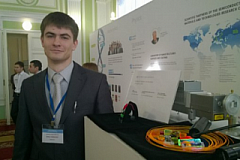Dmitry Tabakaev, graduate student and young scientist at Faculty of Radiophysics enrolled in the programme Devices and Appliances of Nanophotonics at the Department of Quantum Electronics and Photonics, has developed a tunable pulsed medical laser based on solid organic active laser mediums. Now he is studying at the National Taiwan University in an included programme of training. The project leader is Eugene Tel'minov, Associate Professor at TSU, assistant professor at SPhTI.
- Procedures in various areas of medicine, such as surgery, phototherapy, coagulation of blood vessels, ophthalmology, and others, require different wavelength and radiation power - says the researcher. - Currently each wavelength corresponds to a separate device, which means that for 4 procedures you need 4 different lasers. I am developing a device that will introduce a mechanism of smooth tuning of the emission wavelength based on the peculiarities of the emitting medium dye. That is, you can use one installation instead of several. Furthermore, dyes are organic substances, hence their use substantially reduces the cost of the device.
In his work Dmitry uses a method in which the angle of incidence of the radiation on the diffraction grating changes gradually and in that way continuous tuning is achieved.
- The theoretical part of the study is completed, now there is work to optimize the parameters of the scheme. The result will be the creation of a working model of the laser, which will emit at a wavelength of 545-585 nm and 585-625 nm. It is conditioned only to the dye used, - says Dmitry Tabakaev. - If you use a different sample in the same scheme it is possible to get a different tuning range.
The master's programme of the Faculty of Radiophysics Devices and Appliances of Nanophotonics (Director - Alexander Wojciechowski, Head of the Department of Quantum Electronics and Photonics) in 2015 received a certificate of professional public accreditation from the Association of Engineering Education of Russia. The accreditation is granted by assigning the European quality label EUR-ACE (European Accredited Engineer).

